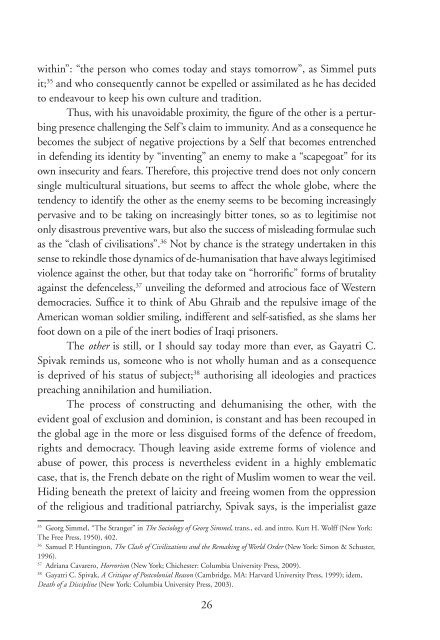Teaching Subjectivity. Travelling Selves for Feminist ... - MailChimp
Teaching Subjectivity. Travelling Selves for Feminist ... - MailChimp
Teaching Subjectivity. Travelling Selves for Feminist ... - MailChimp
You also want an ePaper? Increase the reach of your titles
YUMPU automatically turns print PDFs into web optimized ePapers that Google loves.
within”: “the person who comes today and stays tomorrow”, as Simmel puts<br />
it; 35 and who consequently cannot be expelled or assimilated as he has decided<br />
to endeavour to keep his own culture and tradition.<br />
Thus, with his unavoidable proximity, the figure of the other is a perturbing<br />
presence challenging the Self’s claim to immunity. And as a consequence he<br />
becomes the subject of negative projections by a Self that becomes entrenched<br />
in defending its identity by “inventing” an enemy to make a “scapegoat” <strong>for</strong> its<br />
own insecurity and fears. There<strong>for</strong>e, this projective trend does not only concern<br />
single multicultural situations, but seems to affect the whole globe, where the<br />
tendency to identify the other as the enemy seems to be becoming increasingly<br />
pervasive and to be taking on increasingly bitter tones, so as to legitimise not<br />
only disastrous preventive wars, but also the success of misleading <strong>for</strong>mulae such<br />
as the “clash of civilisations”. 36 Not by chance is the strategy undertaken in this<br />
sense to rekindle those dynamics of de-humanisation that have always legitimised<br />
violence against the other, but that today take on “horrorific” <strong>for</strong>ms of brutality<br />
against the defenceless, 37 unveiling the de<strong>for</strong>med and atrocious face of Western<br />
democracies. Suffice it to think of Abu Ghraib and the repulsive image of the<br />
American woman soldier smiling, indifferent and self-satisfied, as she slams her<br />
foot down on a pile of the inert bodies of Iraqi prisoners.<br />
The other is still, or I should say today more than ever, as Gayatri C.<br />
Spivak reminds us, someone who is not wholly human and as a consequence<br />
is deprived of his status of subject; 38 authorising all ideologies and practices<br />
preaching annihilation and humiliation.<br />
The process of constructing and dehumanising the other, with the<br />
evident goal of exclusion and dominion, is constant and has been recouped in<br />
the global age in the more or less disguised <strong>for</strong>ms of the defence of freedom,<br />
rights and democracy. Though leaving aside extreme <strong>for</strong>ms of violence and<br />
abuse of power, this process is nevertheless evident in a highly emblematic<br />
case, that is, the French debate on the right of Muslim women to wear the veil.<br />
Hiding beneath the pretext of laicity and freeing women from the oppression<br />
of the religious and traditional patriarchy, Spivak says, is the imperialist gaze<br />
35<br />
Georg Simmel, “The Stranger” in The Sociology of Georg Simmel, trans., ed. and intro. Kurt H. Wolff (New York:<br />
The Free Press, 1950), 402.<br />
36<br />
Samuel P. Huntington, The Clash of Civilizations and the Remaking of World Order (New York: Simon & Schuster,<br />
1996).<br />
37<br />
Adriana Cavarero, Horrorism (New York; Chichester: Columbia University Press, 2009).<br />
38<br />
Gayatri C. Spivak, A Critique of Postcolonial Reason (Cambridge, MA: Harvard University Press, 1999); idem,<br />
Death of a Discipline (New York: Columbia University Press, 2003).<br />
26

















